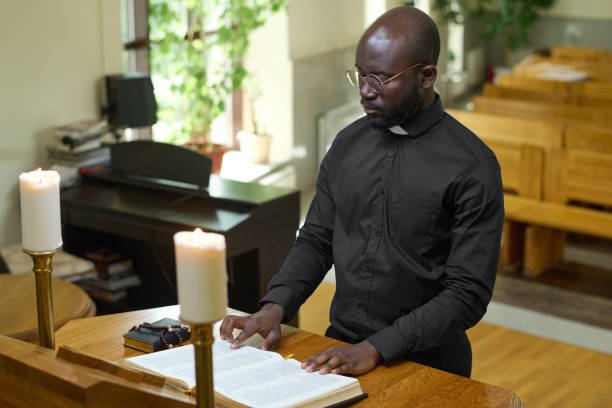In pursuing theological education, prospective students often encounter a pivotal step—the seminary interview. This article delves into the intricacies of commonly asked seminary interview questions, offering insights and guidance to help applicants navigate this crucial phase of their academic and spiritual journey. Whether preparing for your first interview or seeking to refine your responses, this exploration aims to equip you with the knowledge and confidence needed to articulate your calling and convictions effectively.
Table of contents
- 20 Frequently Asked Seminary Interview Questions
- #1. Can you share your journey of faith and how it has led you to pursue theological education?
- #2. What motivated you to apply specifically to our seminary?
- #3. Describe a significant spiritual experience or turning point in your life.
- #4. How do you envision integrating your faith into your future ministry or career?
- #5. What theological issues or doctrines are critical to you, and why?
- #6. How do you handle disagreement or differing theological perspectives within a community?
- #7. Share an example of a challenging ethical decision you’ve faced and how your faith influenced your response.
- #8. In what ways have you been involved in your local church or religious community?
- #9. How do you approach the study and interpretation of Scripture?
- #10. Describe your understanding of the role of women in ministry, if applicable to your context.
- #11. What challenges do you anticipate in seminary, and how do you plan to address them?
- #12. How do you balance academic pursuits with personal spiritual growth?
- #13. Discuss a leadership role you’ve held and its impact on your spiritual development.
- #14. How do you plan to engage with people of different faiths or no faith at all in your ministry?
- #15. What are your strengths and weaknesses, and how will they influence your ministry?
- #16. Explain your perspective on the role of prayer and worship in the life of a seminary student.
- #17. How do you handle stress and maintain a healthy work-life balance?
- #18. Share your thoughts on the current cultural and social challenges from a Christian perspective.
- #19. What is your philosophy of pastoral care and counseling?
- #20. How do you see the intersection of academic study, practical ministry, and personal discipleship in your seminary experience?
- Frequently Asked Questions
- Conclusion
- References
- Recommendations
20 Frequently Asked Seminary Interview Questions
#1. Can you share your journey of faith and how it has led you to pursue theological education?
This question invites applicants to reflect on the narrative of their spiritual journey, emphasizing pivotal moments, influential figures, and experiences that have shaped their faith. It allows the interviewer to gauge the authenticity of the applicant’s connection to their faith and the significance of theological education in their life. When responding, applicants often delve into their conversion story, spiritual milestones, and the gradual development of their calling. An effective response weaves personal anecdotes with a clear articulation of how these experiences have fueled the desire for deeper theological understanding.
#2. What motivated you to apply specifically to our seminary?
This question seeks to uncover the applicant’s awareness of and connection to the seminary. It’s an opportunity for candidates to demonstrate research and discernment in selecting a specific institution for their theological studies. Effective responses typically highlight the seminary’s unique strengths, theological stance, faculty expertise, or specific programs that align with the applicant’s academic and spiritual aspirations. Demonstrating a genuine understanding of the seminary’s ethos and mission contributes to a compelling response.
#3. Describe a significant spiritual experience or turning point in your life.
This question encourages applicants to share a transformative moment that has profoundly impacted their faith and, subsequently, their decision to pursue theological education. Responses often touch upon moments of crisis, revelation, or personal epiphanies, showcasing the depth of the applicant’s spiritual self-awareness. Practical answers narrate the experience and articulate how it has influenced the applicant’s perspective, values, and commitment to theological study.
#4. How do you envision integrating your faith into your future ministry or career?
This question probes into the practical implications of the applicant’s theological education, aiming to understand how their academic pursuits align with their vision for ministry or career. Responses typically outline specific ways the applicant plans to apply theological insights to pastoral care, community engagement, or any relevant field. Articulating a clear and thoughtful integration of faith into future endeavors demonstrates a practical understanding of the role of theology and a commitment to its real-world application in service or leadership.
#5. What theological issues or doctrines are critical to you, and why?
This question delves into the applicant’s theological convictions and priorities to uncover their depth of understanding and personal engagement with theological concepts. Effective responses articulate specific doctrines or issues that resonate with the applicant, providing reasons for their significance. Whether it’s a commitment to social justice, a passion for biblical interpretation, or a focus on doctrinal purity, applicants often use this question to showcase their theological framework’s intellectual and emotional underpinnings.
#6. How do you handle disagreement or differing theological perspectives within a community?
This question explores the applicant’s ability to navigate theological diversity and conflict resolution, crucial skills for effective ministry. Responses typically emphasize the importance of respectful dialogue, active listening, and a commitment to unity amid theological diversity. Successful candidates often share personal experiences of engaging with differing perspectives, highlighting instances where they fostered understanding and cooperation within a community, showcasing their capacity for collaborative and inclusive leadership.
#7. Share an example of a challenging ethical decision you’ve faced and how your faith influenced your response.
This question assesses the applicant’s ethical reasoning and the integration of faith into decision-making. Applicants often recount a specific ethical dilemma, detailing the considerations, values, and ethical frameworks that guided their response. By linking the experience to their faith, applicants illustrate their theological beliefs’ practical implications, emphasizing the relevance of their spirituality in navigating complex moral situations.
#8. In what ways have you been involved in your local church or religious community?
This question seeks to understand the applicant’s practical engagement with their faith community, emphasizing the importance of hands-on experience in addition to academic pursuits. Responses typically highlight roles in leadership, volunteer work, or other forms of active participation within a religious context. Sharing specific examples of contributions and experiences demonstrates commitment and provides insights into the applicant’s understanding of and dedication to the communal aspects of religious life.
#9. How do you approach the study and interpretation of Scripture?
This question delves into the applicant’s methodology and attitude toward biblical study, an essential aspect of theological education. Responses often articulate the applicant’s approach to hermeneutics, the importance of historical context, and the role of personal reflection in interpreting sacred texts. Practical answers demonstrate a balanced understanding of explanation, highlighting a commitment to scholarly rigor and personal spiritual insight in approaching the Scriptures.
#10. Describe your understanding of the role of women in ministry, if applicable to your context.
This question explores the applicant’s perspective on a crucial aspect of contemporary theological discourse. Responses typically navigate between personal beliefs, theological convictions, and an awareness of broader denominational or institutional stances. Depending on their theological tradition, applicants often articulate their commitment to inclusivity, equality, or complementarity. They provide a nuanced and thoughtful response that reflects an understanding of the diverse perspectives within the broader religious community.
#11. What challenges do you anticipate in seminary, and how do you plan to address them?
This forward-looking question encourages applicants to demonstrate self-awareness and strategic thinking. Responses may address academic challenges, personal adjustments, or spiritual struggles commonly accompanying theological education. Successful candidates often outline specific coping strategies, such as seeking mentorship, engaging in spiritual practices, or leveraging support networks. By acknowledging potential challenges and proposing proactive solutions, applicants showcase resilience and a readiness to navigate the rigors of seminary life.
#12. How do you balance academic pursuits with personal spiritual growth?
This question probes into the applicant’s holistic development approach, acknowledging theological education’s dual nature. Responses often emphasize the intentional integration of academic rigor with spiritual formation, detailing specific practices like prayer, meditation, or participation in religious communities. Candidates who can articulate a clear strategy for maintaining equilibrium between intellectual and spiritual growth convey a well-rounded understanding of the demands and opportunities within the seminary environment.
#13. Discuss a leadership role you’ve held and its impact on your spiritual development.
This question invites applicants to reflect on their leadership experiences within a religious or community context. Responses typically recount specific instances where the applicant exercised leadership, highlighting the challenges faced, decisions made, and the subsequent impact on their spiritual journey. Practical answers showcase the symbiotic relationship between leadership responsibilities and personal growth, illustrating how leadership roles contribute to the applicant’s development as a spiritually grounded individual.
#14. How do you plan to engage with people of different faiths or no faith at all in your ministry?
This question addresses the increasingly diverse and pluralistic nature of communities. Responses often outline strategies for fostering interfaith dialogue, understanding cultural nuances, and building bridges of respect and cooperation. Successful candidates demonstrate an openness to diversity, emphasizing the importance of building connections and understanding, even amid theological differences, and showcasing a commitment to inclusive and culturally sensitive ministry.
#15. What are your strengths and weaknesses, and how will they influence your ministry?
This reflective question encourages applicants to assess their personal qualities honestly. Responses often highlight strengths such as empathy, communication skills, or theological understanding while acknowledging growth areas. Practical answers connect these attributes to their potential impact on ministry, illustrating a self-awareness crucial for effective leadership. This question allows applicants to showcase humility, willingness to learn, and understanding how self-awareness contributes to effective pastoral care.
#16. Explain your perspective on the role of prayer and worship in the life of a seminary student.
This question probes into the applicant’s spiritual disciplines and their understanding of the centrality of prayer and worship in theological education. Responses often emphasize the role of these practices in grounding academic pursuits, fostering community, and nurturing personal spirituality. Successful candidates articulate a balance between the academic rigor of seminary life and the transformative power of prayer and worship, highlighting the symbiotic relationship between intellectual and spiritual pursuits within the context of theological education.
#17. How do you handle stress and maintain a healthy work-life balance?
This question addresses the practical aspects of a student’s well-being during the demanding seminary experience. Responses often highlight the importance of self-care practices, time management, and seeking support from peers, mentors, or spiritual practices. Successful candidates demonstrate an awareness of potential stressors in seminary life and articulate proactive strategies to maintain balance, ensuring that the demands of academic study do not overshadow personal health and overall well-being.
#18. Share your thoughts on the current cultural and social challenges from a Christian perspective.
This question explores the applicant’s ability to connect theological principles with contemporary issues. Responses typically touch upon relevant social justice concerns, ethical dilemmas, or cultural shifts, framing them within a Christian worldview. Practical answers demonstrate an understanding of the intersection between faith and the present challenges, showcasing the applicant’s ability to engage critically and compassionately with the broader world while staying rooted in their religious convictions.
#19. What is your philosophy of pastoral care and counseling?
This question delves into the applicant’s approach to providing emotional and spiritual support within a pastoral context. Responses often outline a philosophy that combines theological principles with empathy, active listening, and practical guidance. Successful candidates may draw from personal experiences or theological frameworks to illustrate their approach, showcasing a nuanced understanding of the pastoral role in addressing the diverse needs of individuals and communities.
#20. How do you see the intersection of academic study, practical ministry, and personal discipleship in your seminary experience?
This concluding question encourages applicants to synthesize the various aspects of their theological education. Responses typically emphasize the interconnectedness of academic rigor, hands-on ministry, and personal spiritual growth. Practical answers highlight the potential synergies between theoretical knowledge and practical application, showcasing a holistic vision for how these elements will contribute to the applicant’s development as a well-rounded and effective servant leader within their chosen faith community.
Frequently Asked Questions
Seminary interviews often range from 30 minutes to an hour, allowing time for in-depth discussions about your faith, experiences, and aspirations.
While theological questions are expected, interviews typically focus on personal experiences, beliefs, and integrating your faith with your academic and practical pursuits.
Dress in professional or business casual attire. It’s essential to convey respect for the interview process and the institution.
Yes, honesty is valued. You can share your journey, including doubts, as long as you commit to exploration and growth in your faith.
The timeline varies, but you can typically expect to hear back within a few weeks. Admissions teams strive to provide timely responses to applicants.
Conclusion
Navigating a seminary interview involves thoughtful reflection on personal faith and theological perspectives and integrating academic and practical elements. Articulating one’s journey, beliefs, and vision for ministry is vital to making a compelling case for admission. As applicants engage with diverse questions, they have the opportunity to showcase their theological understanding and convey their readiness to contribute meaningfully to the seminary community and beyond.
References
● trippfuller.com: Frequently asked questions to potential seminarians
● m.facebook.com: The Roman Catholic step-by-step vocation guide.
Recommendations
- 15 Frequently Asked Nahco Oral Interview Questions In Nigeria
- 20 Frequently Asked Questions for Waitress Interview
- 30 Frequently Asked Interview Questions For Sales Representative
- 20 Frequently Asked Call Center Agent Interview Questions in Nigeria
- 20 Frequently Asked Collection Officer Interview Questions And Answers





